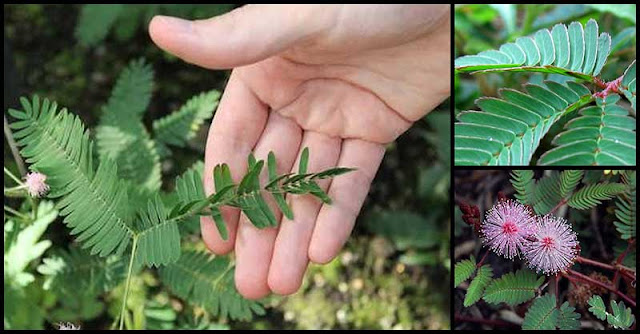Makahiya plant is also called as Touch-Me-Not Plant, Shy plant, Sleeping grass, Prayer plant, and Sensitive Grass. Scientifically, it is known as Mimosa pudica.
This creeping annual or perennial herb prefers areas such as roadsides, lawns, heavily grazed pastures, and vacant allotment. When touched, the plant’s leaves fold or shrink inwards. Actually, the plant is not really shy. It’s Makahiya’s rapid movement to protect itself against harmful elements in the environment. Its leaves will open again after a few minutes.
Because of the various properties and therapeutic compounds found in this evergreen small plant, you can reap numerous benefits from it.
Nutrient Value And Properties
Makahiya is loaded with tannins, a non-protein amino acid (mimosine), alkaloids, flavonoids, fatty acids, sterols, and terpenoids.
Some of its many properties are antibacterial, anti-asthmatic, antidepressant, anti-fertility, aphrodisiac, anticonvulsant, and antivenom as well as an emetic, sedative and tonic properties.
Due to this, the plant has been used for ages to treat many disorders.
Health Benefits of Makahiya Plant
The list below deals with the benefits of this plant :
For Treating Diabetes
In Ayurveda, the makahiya plant can help treat diabetes as it can regulate blood sugar levels in the body by releasing the required amount of insulin. Drink 30ml juice of this plant thoroughly morning and evening. Within 7-10 days you will notice the difference in your blood sugar levels.
For Joint Pain Or Arthritis
The plant has anti-inflammatory properties that can help cure joint inflammation. All you need to do is to make a paste out of its leaves and apply it on your joints overnight and wash the next morning. With regular application, swelling and pain from the joints will start to subside.
For Treating Asthma
When it comes to asthma treatment, the makahiya plant can help by clearing the airway path of any allergens, dust, and inflammation thereby providing relief from its symptoms. Simply prepare 15 ml of juice extracted from the plant. Drink it two times a day for best results.
For Excessive Bleeding During Menstruation
Found in Makahiya plant are properties that can help balance out hormones in the body, thereby providing relief from excessive bleeding during menstruation.
Here’s what to do: Mix 6 teaspoons of the juice of this plant (extract from the leaves) and honey. Drink this mixture thrice a day.
Cures Piles Or Bleeding Piles Or Hemorrhoids
The leaves of the plant have been known as a hemorrhoid remedy since at least the 16th century. Its phenol content and antioxidant action help heal wounds quickly, like bleeding hemorrhoid. Simply make a powder from its leaves and mix 1 teaspoon in a glass of milk. Drink this twice a day.
For Treating High Blood Pressure
Take leaves of this plant and crush them to extract the juice. Consume 15 ml twice a day and say goodbye to your high blood pressure problems.
Treating Insomnia
If you want to relax your brain and body from anxiety and stress, the makahiya plant can give you a helping hand. Sleeping becomes a lot easier when your brain is at peace.
For this purpose, take leaves of this plant (5gm) and crush them to make a paste. Boil the paste in hot water, strain, and take during nighttime. For best results take the solution within 15-20 days.
For Treating Diarrhea
Treat diarrhea using the juice from the leaves of the plant. It can replenish the body with the required water balance. Achieve good results by drinking 30ml of the extract a few times.
For Treating Stomach Ache And Intestinal Worms
Thanks to its anti-bacterial properties, the makahiya plant can effectively kill the bacterial build-up in the body.
If you have problems with a stomachache and intestinal worms, simply make a paste out of the plant’s leaves and mix with honey. Take the mixture once a day until you feel better.
Jaundice
To treat jaundice, extract juice from the leave of the plant and give 20-40 ml to the patient twice a day for three weeks.









